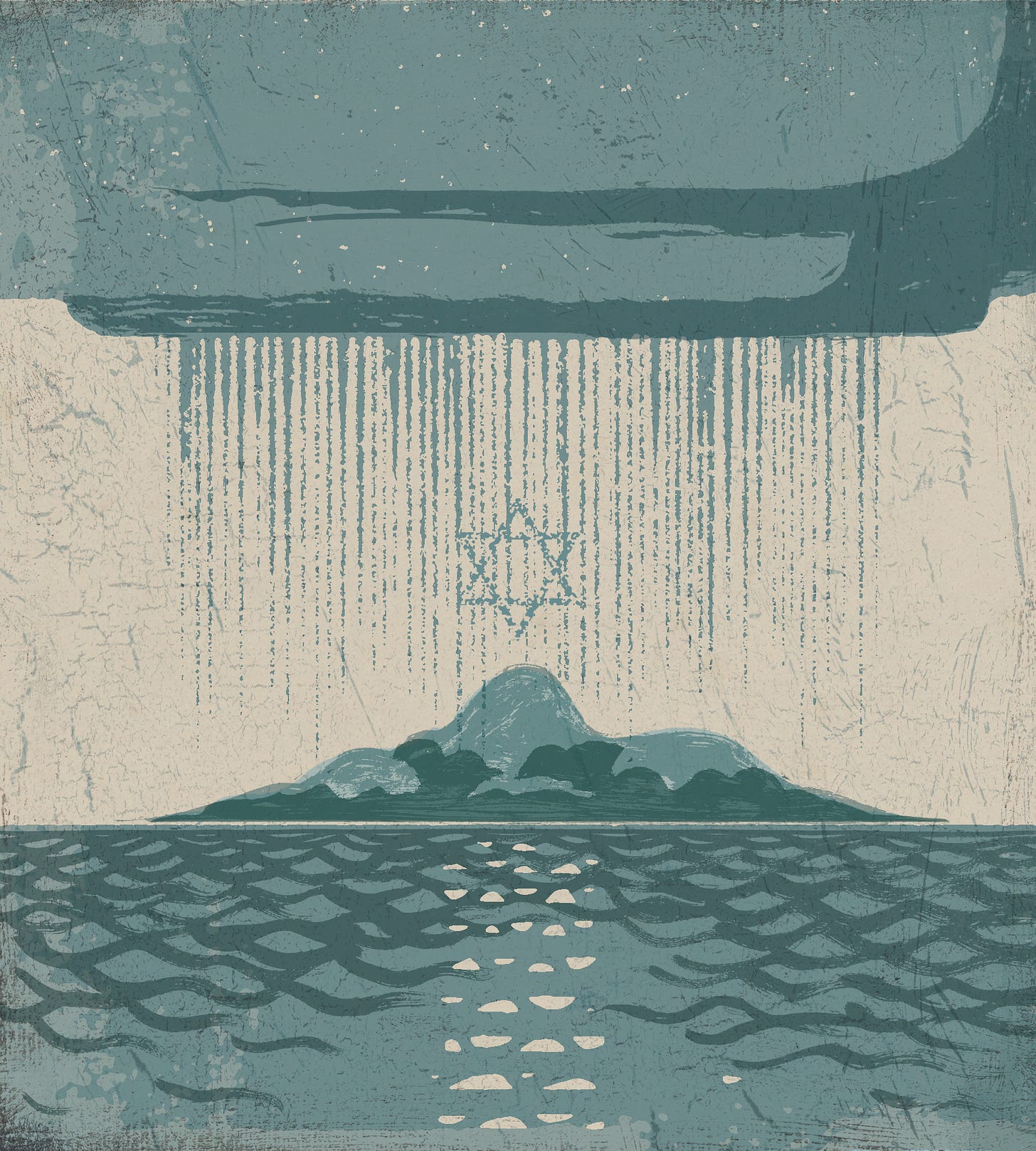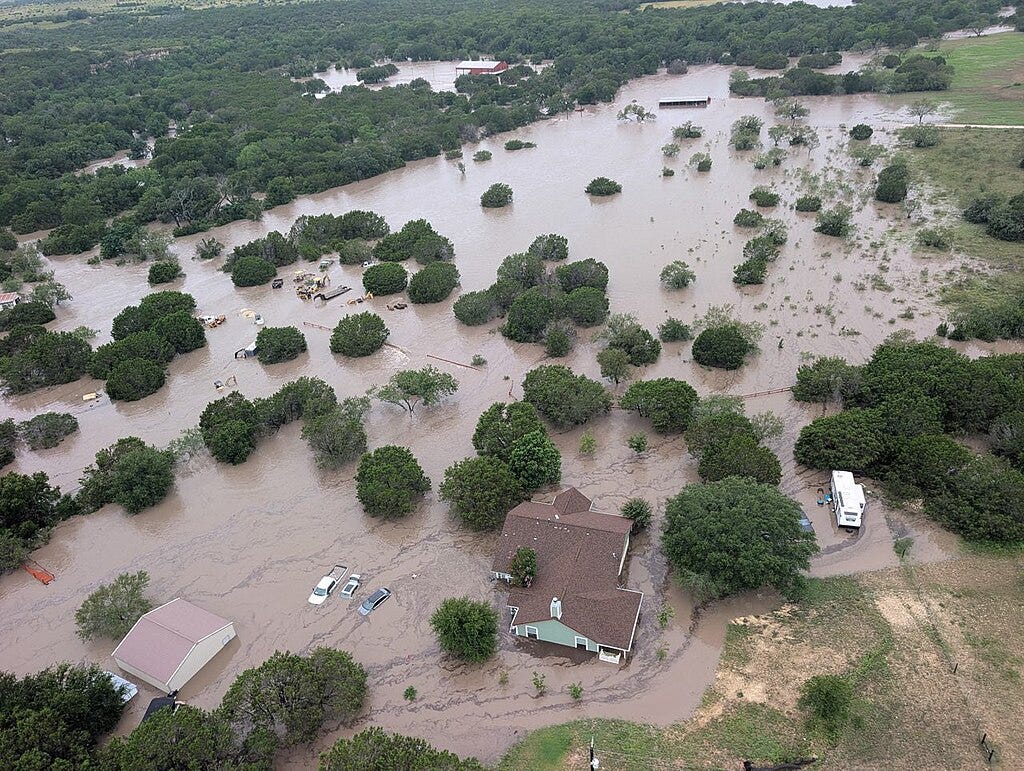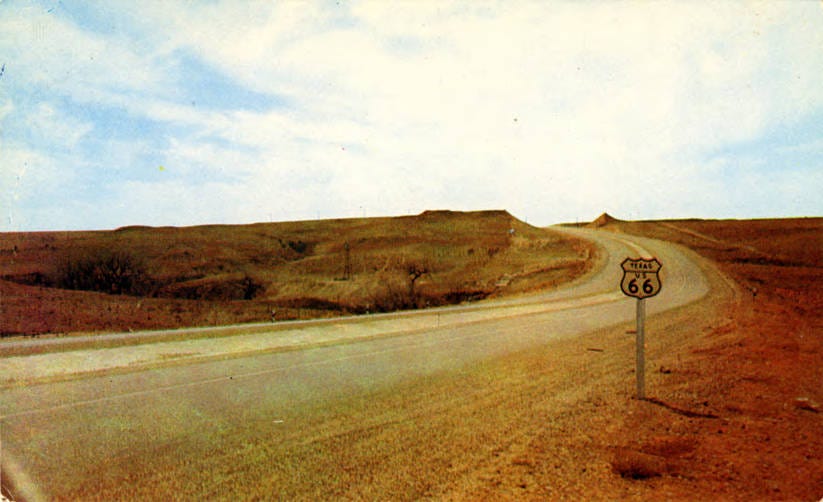High Water
Christian Zionism, flash floods, road trips, and romantic comedies.
Timeless stories from our 175-year archive handpicked to add context to the news of the day.
Lost Tribes of the South Pacific
In the Harper’s Magazine July issue, Pete McKenzie reports from the Pacific islands to investigate how a band of island nations became Israel’s staunchest defenders. McKenzie speaks with Mikaele Mudreilagi, “a stocky fifty-nine-year-old science teacher turned evangelical preacher with a shaved head and ghostly white goatee,” who leads Fiji’s chapter of the pro-Israel group called the International Christian Embassy Jerusalem. “Many in the Pacific not only sympathize with Israel; like Mudreilagi, they believe they are literally descended from Jews,” writes McKenzie. The Pacific islands’ committed support for Israel stems from a legend that one of the Lost Tribes of Israel made their way through Asia and down to the South Pacific. “The myth seemed a striking example of the geopolitical power of storytelling: the tale’s boosters have helped motivate a quiet region into controversial global advocacy—and inoculated it against the antiwar repulsion sweeping the rest of the world,” writes McKenzie. “Even so, I still expected to find only a ragtag collection of hucksters and eccentrics of the kind that so often find a foothold in the remote South Seas. Instead, to my surprise, I found a fable championed by lawmakers and prime ministers, with the potential—if I could only bring myself to believe—to take me from the reputed resting place of the Ark of the Covenant, through supposedly ancient Jewish temples, and finally, into Paradise itself.”
In July 2016, Tom Bissell toured Israel with 450 Christian Zionists, led by the conservative talk show host Dennis Prager. “A recent Pew study of Christian fundamentalism found that 63 percent of white evangelicals believe that the creation of a Jewish state in modern times fulfills the supposed biblical prophecy of Jesus’ Second Coming. Yet not one evangelical Christian I will meet on tour seems interested in any of that,” writes Bissell. “Rather, the conservative Christian love of Israel that I will encounter, over and over again, seems bound up in a notion of God the Father, who has two children: Israel and the United States. This Israel — not a nation but a wayward brother — lies beyond history, beyond the deaths and wars that made it, beyond the United Nations, beyond the Oslo Accords, beyond any conventional morality.”
Flooding in Texas
[May 1941]
“One flood stands out in my memory. It is still spoken of as ‘The Noah.’ In the darkness that precedes the dawn someone banged at our door and called, ‘There's a flood coming; the biggest in history. If you've got any cattle on the river bottom you'd better move them.’ … Suddenly the cry rang out, ‘She’s acoming!’ People crowded to the edge of the slope, climbed into their wagons and on to the spring seats and, shading their eyes with their hands, looked to the east. Like a great wall fully four feet high it came, black, the front of it like an enormous steam roller in its motion.”
Read “The Water’s In” by Juanita Brooks
[March 1973]
At 8:00 A.M., February 26, 1972, a dam collapsed on the headwaters of Buffalo Creek in Logan County, West Virginia. It was midafternoon before the news media in Charleston, 100 miles away, learned of the flood and two months before the missing were presumed dead, establishing the final toll at 125.
Read “After the Flood” by Mary Walton
[August 2015]
“For more than a century, New Orleans had been at war with the water that surrounds it.”
Read “In the Shadow of the Storm” by Rebecca Solnit
Are We There Yet?
[August 1932]
“There are four people in the car … These passengers are pleased with life. They will be in Los Angeles that night, they have seen a lot of country, and they are on very friendly terms for people who, a week before in New York, were total strangers.”
Read “Fourth-Class Travel, American Style” by Robert Littell and John J. McCarthy
[March 1998]
“They are off Route 55, at the first McDonald’s outside of Chicago. They are on a vacation, a road trip, a pile-stuff-in-and-go kind of thing.”
Read “Lucky Ducks” by Lorrie Moore
[February 2008]
“‘One day, I'd like to drive to the coast,’ she said as we sat by the fire and her live-in maid prepared dinner. The way she said it made the trip sound vaguely romantic, a bit dangerous or at least unusual, more exploration than mere tourism; and indeed, until only quite recently, traveling Colombia by car was just not done, at least not by those in her social stratum.”
Read “Go Before You Die” by Patrick Graham
[June 2012]
On the road, a life real and imagined.
Read “My Old Man” by Clancy Martin
[April 2017]
“I prize long road trips, especially lately, in this era of gruesome political news and ceaseless social-media conflict: ambitious drives are a good excuse for being disconnected.”
Read “You Can Run” by Walter Kirn
He Loves Me, He Loves Me Not
[November 1981]
“The story I am about to tell concerns one of those evenings. I tell it because it has remained in my memory like a film, the kind of film I have always wanted to make but have never been able to, a mechanism not of facts but of moments that speak of the secret tensions in those facts, as flowers reveal the tensions in a tree.”
Read “One Summer Night” by Michelangelo Antonioni
[August 2013]
“Couples speak their own language, an invented tongue that deepens or dies out over time. Couples in the movies must convince us of this, their culture of two, whose hidden etymologies extend far below what is said or shown. It is a task undertaken in the hope of making love real for an audience; but not too real, not so real as to spell out in full what exists privately and provisionally—a vocabulary as feathered and elusive as a bird of paradise dancing, under some distant jungle cover, for his mate. A viewer should only pick up the accent, recognize its counterpart in her own life, perhaps even find some relief from whatever silence or tangled syntax is waiting at home.”
Read “The Commitments” by Michelle Orange












